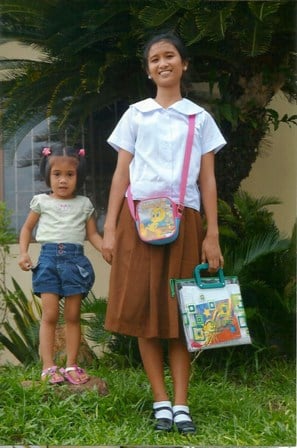Before Geah became pregnant at 17, she considered herself a typical teenage girl who would hang out with friends and boyfriend, against the wishes of her parents who thought she should stay home, focus on her studies and finish school.

Though her pregnancy was unexpected, she said, she was excited and happy to know that soon she would have a baby, just like some of her friends did. Her boyfriend was happy about it too, but because he did not have a job and depended on his parents, he could not offer much help to her.
One day, Geah went to a health centre in Bago for a check-up. One of the workers there knew Geah and informed her mother, who was furious when she found out about the pregnancy but nevertheless promised to support her and took her regularly to a clinic for antenatal care.
During the pregnancy, Geah remained in school but dropped out after giving birth.
Several months later, she and her parents and younger brother were invited to participate in a course to teach parents and family members about adolescent health and development, to equip them with knowledge and skills to understand the challenges faced by adolescent mothers and to help them cope with the stressors. The course was hosted by the Salas Youth ACCESS Center, established by the City Government of Bago through the City Population Office in partnership with Rafael Salas Foundation and with funding assistance from UNFPA in the Philippines.
ACCESS is staffed by trained youth peer counsellors and caters to the needs of both in-school and out-of-school youth.
Geah said that after the training, her parents understood her situation better and gave her more support and encouragement. The lines of communication with her parents also improved, she said.
Support from her parents and ACCESS enabled her to return to school. ACCESS also provided contraceptives to help her delay her next pregnancy until after she completes her education, which she says will help her get a good job and make enough money to provide for her family.
—Angie Tanong, Commission on Population

